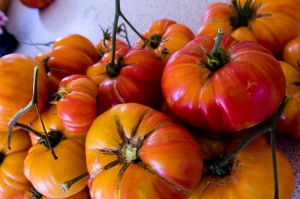We think there’s an urban food production industry waiting to be recognised.John McKenzie
Want to see abundant quality food harvested in our neighborhoods? Good news on that front: Growstuff and Permaculture Melbourne are developing a tool to record and share our harvests, and to show how much food is being grown in urban and suburban gardens. It’s now live.
John McKenzie from Permaculture Melbourne lays out the vision:
We want to find what the best gardeners can produce on their plots of land. This becomes a benchmark for their area. The benchmarking project is hoping to indicate the power of urban gardening. If 20% of households could grow at the benchmark rate, then how much food could an urban community produce? We think it’s a huge amount. We think there’s an urban food production industry waiting to be recognised.
The aggregated data will tell us about the capacity of our communities to feed ourselves, broken down by area and crop type. This is the first time data has been collected and made available in this way – a milestone for urban food growing and urban resilience.
Growstuff is the platform – an open source, collaborative, community-oriented gardening site and social network. They’re building a database of crops, harvests, planting advice, seed sources, and more, that anyone can use for free for any purpose under a Creative Commons license. (If you can handle more adjectives, it’s also open data, with an API, independent, ad-free and operated as a social business.)
Growstuff is headed up by ex-Google coder and food grower, Alex Bayley. I’ve doing pair programming on the harvest tool with Alex, and learning much – her coding skills are so far ahead of mine that I’m pretty much watching her code, but that’s the collaborative and inclusive approach of Growstuff. I can vouch for Alex, who could be earning big money in the tech industry, but is instead following what she believes in, and does much of her coding at a kitchen table, looking out on a vegetable garden.
Be part of Benchmarking Harvests
So, food growers and supporters, here’s how to get behind Benchmarking Harvests:
- Sign up for a paid membership with Growstuff. Use the signup code HARVEST2013, so we know how you arrived. Free memberships are fully functional, awesome, and ad-free, but as a paid member you have the warm glow of knowing that you’re making Growstuff and the Harvest Benchmarking project possible, and you’re identified as a supporter on your profile.
- Share this with the gardeners you know:
- Check out the harvests and record your harvests on Growstuff’s brand new harvest page – and stay tuned as we refine it and add more features.
Boosting local food and resilient communities
Think how motivating it will be to know that gardeners are producing not just a few tomatoes, but hampers and buckets full of delicious, fresh food, in our own neighborhoods. This will be a real boost to urban food growing and local resilience, to have this knowledge and data about local food production – for our own knowledge, for our communities, and in our dealings with our local governments. Knowing what successful gardeners can produce on their own land and mapping this by area, we can discover the potential of urban gardening.
Thank you to Lucas Gonzalez from the Appropedia community, who connected us up via Twitter – the spark that let this synergy happen.
Update: Alex Bayley describes the new functionality at Track your harvests with Growstuff.

